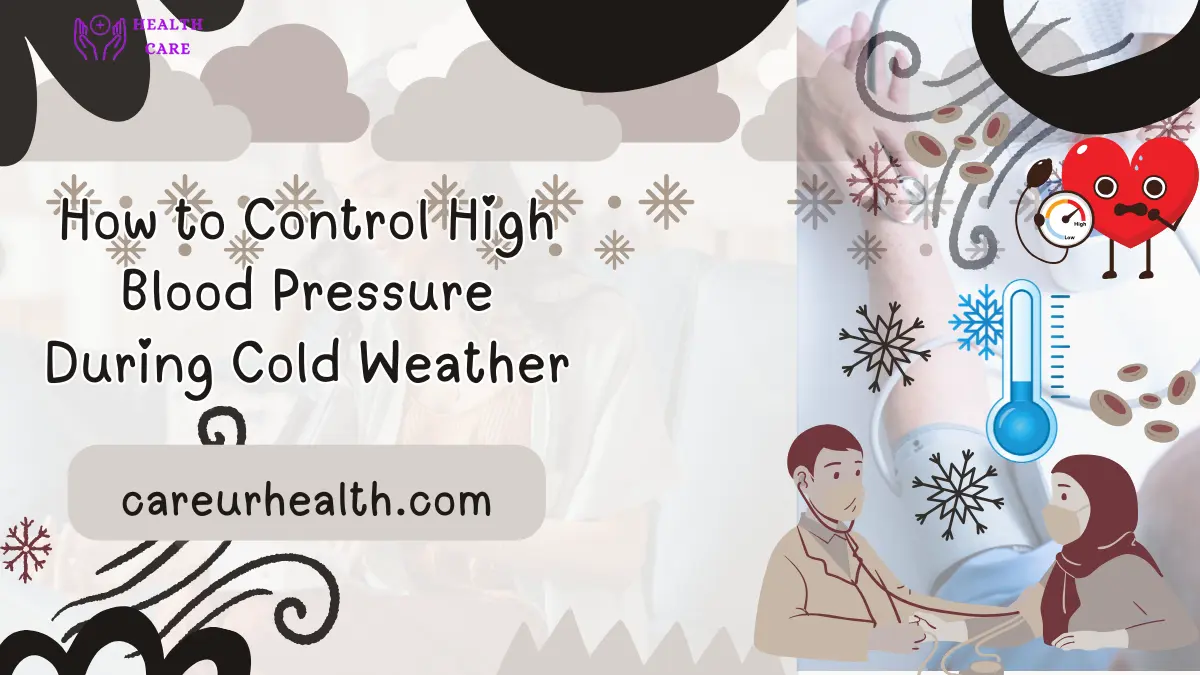Introduction
Knowing how to control high blood pressure in winter is crucial for maintaining your cardiovascular health. Cold weather can significantly impact blood pressure levels, especially in individuals already diagnosed with hypertension.
The narrowing of blood vessels due to colder temperatures makes the heart work harder, resulting in higher blood pressure.
“Managing blood pressure in winter requires specific lifestyle adjustments and vigilance. This guide explores strategies to maintain optimal blood pressure during the chilly months.”
Key Takeaway: Winter Blood Pressure Management
- Dress warmly to prevent cold-induced vasoconstriction.
- Engage in regular indoor physical activity to maintain circulatory health.
- Monitor your blood pressure regularly for early intervention.
- Limit alcohol and caffeine to avoid spikes in blood pressure.
- Maintain a balanced diet rich in heart-friendly nutrients.
Understanding the Impact of Cold Weather on Blood Pressure
The Science Behind Cold and Hypertension
Cold weather causes vasoconstriction, or the narrowing of blood vessels, which increases resistance to blood flow and leads to higher pressure.
It’s important to learn how to control high blood pressure in winter through diet and exercise. For hypertensive individuals, this natural response can exacerbate health risks. Recognizing the link between weather and blood pressure fluctuations is crucial for proactive management during winter.
Dress Appropriately for the Weather
The Importance of Staying Warm
Wearing warm clothing minimizes the body’s response to cold temperatures. Layering up with thermal wear, scarves, and gloves helps maintain body temperature and reduces the risk of blood pressure spikes.
Understanding how to control high blood pressure in winter can prevent serious complications. Dressing for the weather is an effective first step in preventing complications from hypertension during winter.
Cold weather can pose unique challenges for individuals with high blood pressure, or hypertension.
The body’s natural response to cold includes vasoconstriction (narrowing of blood vessels), which can increase resistance to blood flow, making it harder for the heart to pump blood effectively.
Understanding how to mitigate these effects is essential to maintaining a healthy blood pressure level during winter months. This guide provides actionable steps to control hypertension and keep your heart in optimal condition even in colder climates.
How Cold Weather Affects Blood Pressure
The Connection Between Cold and Hypertension
In colder weather, blood vessels narrow to conserve heat, increasing blood pressure as a result. Doctors often advise patients on how to control high blood pressure in winter with proper hydration and warm clothing.
This physiological response can strain the heart, particularly for individuals with pre-existing hypertension or cardiovascular issues.
Cold-induced high blood pressure is often accompanied by increased sensitivity to stress, which further exacerbates the problem. Recognizing this link allows for more targeted preventative measures to protect your heart during winter.
Dressing Warmly to Prevent Vasoconstriction
Layers as Your First Line of Defense
Wearing warm clothing, such as insulated jackets, scarves, and gloves, helps prevent rapid heat loss and reduces vasoconstriction.
Learning how to control high blood pressure in winter involves monitoring your blood pressure regularly. Ensure that your head, hands, and feet are adequately covered, as these areas are most susceptible to heat escape.
Layering with breathable fabrics minimizes sweating while keeping you warm, reducing the risk of blood pressure spikes caused by cold exposure.
Indoor Exercise for Better Cardiovascular Health
Why Indoor Workouts Are Ideal in Winter
Practicing yoga for high BP patients can significantly lower stress and improve overall well-being. Maintaining physical activity is essential for managing blood pressure year-round, but extreme cold can make outdoor exercise unsafe.
Opt for indoor workouts like yoga, pilates, or treadmill walking to maintain your heart health without exposing your body to harsh temperatures. Regular physical activity improves blood circulation and helps combat the effects of cold-induced hypertension.
Balanced Diet: A Key to Winter Wellness
Nutritional Changes for the Cold Months
Your diet plays a critical role in managing hypertension, particularly during winter. Regular physical activity is one of the key factors controlling blood pressure effectively.
Focus on consuming a variety of fruits, vegetables, whole grains, and lean proteins that support heart health.
One strategy for how to control high blood pressure in winter is staying physically active indoors. Limit the intake of salty and processed foods, which can elevate blood pressure levels. Incorporate foods rich in potassium, magnesium, and antioxidants, as these nutrients are known to lower blood pressure and improve overall heart health.

Stay Hydrated and Limit Stimulants
The Role of Fluids in Blood Pressure Control
Dehydration can occur even in cold weather and may lead to higher blood pressure. Ensure you drink enough water throughout the day, while limiting caffeine and alcohol, which can exacerbate hypertension.
If you’re unsure how to control high blood pressure in winter, consult a healthcare professional for guidance. Herbal teas, such as chamomile or green tea, are excellent alternatives for keeping hydrated without raising blood pressure.
Regular Monitoring for Peace of Mind
Early Detection Through Consistent Tracking
Invest in a reliable blood pressure monitor to track your readings regularly. Frequent monitoring allows you to detect fluctuations early and consult your healthcare provider if necessary.
Tips on how to control high blood pressure in winter include limiting sodium intake and reducing stress. Keeping a log of your readings during winter helps identify patterns and tailor your management strategies more effectively.
Sleep Quality and Stress Management
Rest and Relaxation for a Healthy Heart
Sleep and stress levels have a direct impact on blood pressure regulation. Cold weather can affect sleep quality, making it crucial to create a warm, cozy sleep environment.
Incorporate relaxation techniques, such as meditation or deep breathing, to manage stress, which is a known contributor to hypertension. Aim for 7-9 hours of sleep each night to support your cardiovascular health.
Consult Your Healthcare Provider Regularly
Importance of Professional Guidance
Discussing your condition with a healthcare provider ensures that your hypertension treatment plan is adjusted for seasonal changes.
Discovering how to control high blood pressure in winter can help you enjoy the season safely. Your doctor may recommend specific medications or lifestyle modifications to address winter-specific blood pressure risks.
People experiencing stress-induced hypertension benefit greatly from breathing exercises for high BP. Regular check-ups help prevent complications and keep your management strategies on track.
Cold Weather and Hypertension Management
- Wear layers and keep warm to prevent vasoconstriction.
- Opt for indoor exercises to maintain cardiovascular fitness safely.
- Eat a heart-healthy diet rich in essential nutrients.
- Monitor your blood pressure consistently to detect fluctuations early.
- Stay hydrated and avoid excessive caffeine or alcohol consumption.
Combining breathing exercises for high BP with meditation enhances heart health. Managing blood pressure during winter requires a proactive approach that includes lifestyle changes, regular monitoring, and professional guidance.
By addressing the unique challenges posed by cold weather, you can maintain your heart health and reduce the risk of complications associated with hypertension. Implement these strategies to stay healthy and enjoy the winter season with confidence.
Maintain Regular Physical Activity Indoors
Winter-Friendly Exercise Options
Staying active is vital for blood pressure control, even during colder months. Consider indoor exercises such as yoga, pilates, or treadmills to avoid cold-induced stress on the heart.
Physical activity improves circulation and helps maintain a healthy cardiovascular system year-round.
Monitor Your Blood Pressure Frequently
Staying Informed About Your Health
Frequent blood pressure monitoring allows early detection of any adverse changes. Use a reliable at-home monitor and keep a record of your readings.
Practicing breathing exercises for high BP daily helps in managing hypertension naturally. Consistent tracking helps you and your doctor develop tailored strategies to manage fluctuations effectively.
Prioritize a Balanced Diet
Nutritional Tips for Winter
Eating a diet rich in fruits, vegetables, and whole grains can reduce the risk of hypertension.
Limit your intake of salty and processed foods, which can worsen blood pressure issues. Including heart-healthy fats like omega-3 fatty acids is also beneficial for controlling blood pressure during winter.
Winter brings unique challenges for those managing high blood pressure (hypertension). The cold weather, seasonal illnesses, and lifestyle changes during the holidays can lead to increased stress on the cardiovascular system.
By understanding the specific factors that influence blood pressure during winter, you can adopt effective strategies to maintain heart health and overall well-being.
Impact of Cold Temperatures on Blood Pressure
Cold weather causes blood vessels to constrict, which increases resistance to blood flow and raises blood pressure. This natural response, known as vasoconstriction, can put extra strain on the heart.
Simple breathing exercises for high BP, like deep breathing, can stabilize blood pressure effectively. To combat this, it’s essential to stay warm by dressing in layers, wearing insulated clothing, and avoiding prolonged exposure to freezing temperatures.
Simple precautions like using hats, scarves, and gloves can help reduce the risk of cold-induced hypertension.
The Role of Physical Activity
Many people reduce their physical activity levels during the winter due to shorter days and colder weather. Doctors often suggest breathing exercises for high BP as they promote relaxation and reduce tension.
Lack of exercise weakens the heart and reduces circulation efficiency, which can worsen hypertension.
Indoor exercises, such as yoga, resistance training, or treadmill walking, can help maintain a regular fitness routine. Even short sessions of movement improve heart health and manage blood pressure levels effectively.
Winter Illnesses and Their Influence
Seasonal illnesses like colds, flu, and respiratory infections are more common during winter. These illnesses can elevate blood pressure as the body works harder to fight off infection.
The added stress and inflammation can worsen hypertension symptoms.
Regular breathing exercises for high BP can help lower stress levels and improve circulation. Preventive measures, such as getting a flu shot, maintaining good hygiene, and consuming immune-boosting foods, are critical to avoiding complications.
Dietary Challenges During the Holidays
The holiday season often leads to overindulgence in rich, salty, and sugary foods. High sodium intake increases water retention, which raises blood pressure and places extra strain on the cardiovascular system.
To counteract this, focus on a heart-healthy diet rich in whole grains, lean proteins, fruits, and vegetables. Limiting processed foods and monitoring sodium consumption can help maintain healthy blood pressure levels during festive meals.
Stress and Emotional Well-Being
Winter holidays can bring significant stress due to busy schedules, financial pressures, and social commitments. Stress triggers hormonal changes that constrict blood vessels and elevate blood pressure.
Incorporating relaxation techniques like meditation, deep breathing, or mindfulness can help manage emotional well-being.
Prioritizing adequate sleep and setting realistic expectations for holiday plans can reduce unnecessary stress.
Importance of Staying Hydrated
Dehydration is a common but overlooked issue during the winter. Cold weather often reduces the sensation of thirst, leading to lower water intake.
Dehydration thickens the blood, making it harder for the heart to pump effectively. Staying hydrated with water, herbal teas, or warm broths helps maintain proper circulation and reduces the risk of blood pressure fluctuations.
Monitoring Blood Pressure Regularly
Regular monitoring is vital during winter to track changes in blood pressure. Fluctuations are more likely due to colder temperatures and other seasonal factors. Home blood pressure monitors provide accurate readings and enable early intervention if levels rise.
Incorporating yoga for high blood pressure into your routine can support overall heart health. Keeping a log of daily measurements can help identify patterns and guide discussions with healthcare providers about necessary adjustments.
Limiting Alcohol and Caffeine
Excessive consumption of alcohol and caffeinated beverages during winter can negatively impact blood pressure. Alcohol increases dehydration and adds strain to the heart, while caffeine can temporarily elevate heart rate and blood pressure.
Many people turn to yoga for high blood pressure because of its natural and holistic benefits. Moderation is key—switching to herbal teas or decaffeinated drinks can provide warmth and comfort without adverse effects.
By adopting these strategies, you can effectively manage high blood pressure during the winter months. Focusing on warmth, physical activity, a balanced diet, and stress reduction ensures cardiovascular health and overall well-being.
Proactively monitoring blood pressure and addressing seasonal challenges reduces the risk of complications and promotes a healthier, more enjoyable winter season.
Limit Alcohol and Caffeine Intake
Moderation is Key
Using yoga for high blood pressure management involves poses that calm the nervous system. Both alcohol and caffeine can elevate blood pressure, especially in colder months when the body is already under stress. Limit your consumption to avoid unnecessary strain on the heart.
Staying hydrated with water or herbal teas is a healthier alternative to combat dehydration, which can also raise blood pressure.
Get Adequate Sleep
Rest for a Healthy Heart
Experts recommend yoga for high blood pressure as it promotes relaxation and lowers heart rate.
Proper sleep is essential for cardiovascular health and managing hypertension. Poor-quality sleep can lead to increased stress and higher blood pressure levels. Ensure you have a warm, comfortable environment conducive to good sleep hygiene during winter.
Stay Connected with Your Healthcare Provider
Regular Check-ups Are Essential
Consulting your doctor regularly ensures you receive appropriate advice and medication adjustments for winter-specific blood pressure changes.
Practicing yoga for high blood pressure can help reduce stress and improve circulation. Open communication helps tailor your treatment plan and provides peace of mind throughout the season.
SAAOL Heart Center
Conclusion
Managing blood pressure during winter requires a comprehensive approach that combines lifestyle modifications, regular monitoring, and professional guidance. By staying proactive, you can enjoy the colder months without compromising your health.
Embrace these strategies to keep your heart healthy and resilient against seasonal challenges. To learn how to control high blood pressure in winter, focus on healthy habits like a balanced diet and sufficient rest.
FAQs
- How does cold weather affect blood pressure?
Cold weather causes blood vessels to constrict, increasing resistance and pressure. - What foods help manage blood pressure in winter?
Incorporate foods rich in potassium, magnesium, and omega-3s like leafy greens and fish. - Can exercise in the cold raise blood pressure?
Vigorous outdoor exercise in cold temperatures may temporarily increase blood pressure, so indoor activities are preferable.










